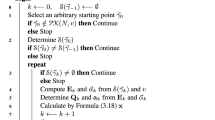Abstract
It is desirable that artificial agents can help each other when they cannot achieve their goals, or when they profit from social exchanges. In this work we study coalition formation processes supported by enforced agreements and we define two qualitative criteria, the do-ut-des property and the composition property, that establish when a coalition is admissible to be formed. The do-ut-des property is based on a balance between the advantages and the burdens of an agent, when it agrees an enforced agreements. The composition property is a refinement of the do-ut-des property that takes into account also the costs and the risks deriving from the coalition formation process.
Two relevant aspects distinguish our approach from the solution criteria developed in cooperative game theory. First, the do-ut-des property and the composition property are not based on an explicit utility function associated to the goals of an agent, and hance they can be used also in that cases in which the importance that agents give to their own goals is unknown. Second, a coalition has all the necessary information to establish if it satisfies the do-ut-des property or the composition property, therefore these two properties can be used in the case not all the space of possible coalitions is known.
Similar content being viewed by others
References
Alonso E (1998) How Individuals Negotiate Societies. In: Proceedings of the 3rd International Conference on Multi-Agent Systems (ICMAS’98). Paris, France, pp 18–25
Alur R, Henzinger T, Kupferman O (2002) Alternating-time temporal logic. J ACM 49(5):672–713
Aumann R (1961) The core of a cooperative game without side payments. Trans Amer Math Soc 98:539–552
Boella G, Sauro L, Torre L (2004) Abstraction from Power to Coalition Structures. In: Proceedings of the 16th Eureopean Conference on Artificial Intelligence (ECAI’04), pp 965–966
Boella G, Sauro L, Torre L (2005) Admissible agreements among goal-directed agents. In: Procs. of 2005 IEEE/WIC/ACM International Conference on Intelligent Agent Technology (IAT’05). Paris, France
Boella G, Torre L (2004) Contracts as Legal Institutions in Organizations of Autonomous Agents. In: Proceedings of the 3rd International Joint Conference on Autonomous Agents & Multiagent Systems (AAMAS’04). New York, USA, pp 948–955
Castelfranchi C (2000) Founding Agents Autonomy on Dependence Theory. In: Proceedings of the 14th European Conference on Artificial Intelligence (ECAI’00). Berlin, Germany, pp 353–357
Castelfranchi C (2003) The Micro-Macro Constitution of Power. ProtoSociology, pp 18-19
Conte R, Sichman JS (2002) Dependence gaphs: Dependence within and between groups. Comput Math Organ Theory 8(2):87–112
Cormen T, Rivest CLR (1990) Introduction to algorithms. MIT Press
Ferber J (1999) Multi-Agent Systems, An introdiction to Distributed Atificial Intelligence. Addison-Wesley
Hoek W, Wooldridge M (2005) On the Logic of Cooperation and Propositional Control. Art Intell, 64:1–2, 64(1–2):81–119
McMillan K (1992) Symbolic Model Checking. Ph.D. thesis, CMU University
Osborne M, Rubinstein A (1994) A Course in Game Theory. MIT Press
Pauly M (2002) A Modal Logic for Coalitional Power in Games. J Logic Comput 12:146–166
Peleg B (1998) Effectivity functions, game forms, games, and rights. Soc Choice Theory 15:67–80
Sauro L (2006) Formalizing Admissibility Criteria in Coalition Formation among Goal-directed Agents. Ph.D. thesis, University of Torino
Sichman JS, Conte R, Castelfranchi C, Demazeau Y (1994) A Social Reasoning Mechanism Based On Dependence Networks. In: Proceedings of the eleventh European Conference on Artificial Intelligence (ECAI’94). Amsterdam, The Netherlands, pp 188–192
Sichman JS, Demazeau Y (2001) On Social Reasoning in Multi-Agent Systems. Revista Iberoamericana de Inteligencia Artificial 13:68–84
Tarski A (1955) A Lattice-Theoretical Fixpoint Theorem And Its Applications. Pac J Math 5:285–309
Wooldridge M, Jennings J (1994) Towards a Theory of Cooperative Problem Solving. In: Perram JW, Müller J-P (eds) Proceedings of the sixth European Workshop on Modelling Autonomous Agents in Multi-Agent Worlds (MAAMAW-94), Vol. 1069 of Lecture Notes in Computer Science. Springer, Odense, Denmark, pp 40–53
Author information
Authors and Affiliations
Corresponding author
Additional information
Luigi Sauro graduated in Physics at the University “Federico II” of Naples in 2001. From February 2002 to July 2002 he was collaborator at the SRA division of the IRST Institute (Trento). He got is Ph.D. in Computer Science from University of Torino in February 2006. Currently he is member of the Natural Language Processing and Agents Group, directed by prof. Leonardo Lesmo. His research interests include social reasoning, coalition formation and coordination in multiagent systems.
Rights and permissions
About this article
Cite this article
Sauro, L. Qualitative criteria of admissibility for enforced agreements. Comput Math Organiz Theor 12, 147–168 (2006). https://doi.org/10.1007/s10588-006-9541-y
Issue Date:
DOI: https://doi.org/10.1007/s10588-006-9541-y




